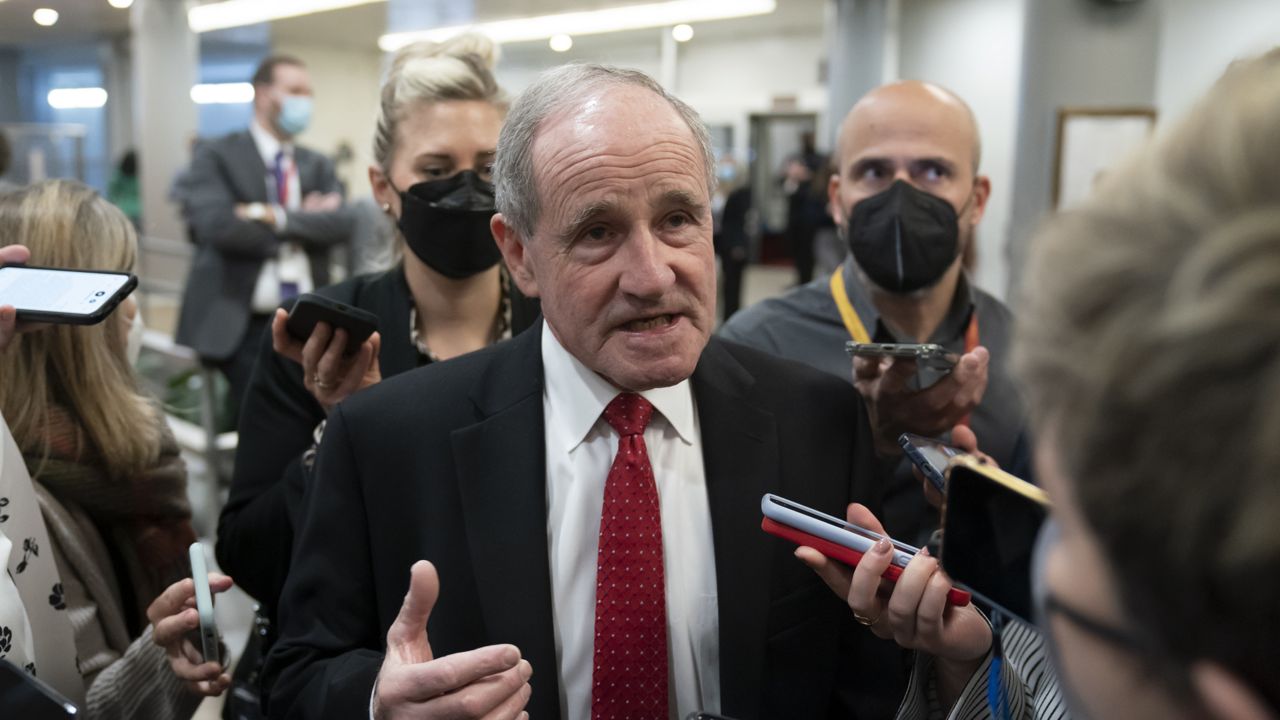A bipartisan group of senators introduced legislation this week to formally recognize Russia’s actions in Ukraine as genocide, putting forward the bill shortly after Ukrainian first lady Olena Zelenska delivered a heart-wrenching address to both chambers of Congress.
Sen. Jim Risch, R-Idaho, and Sen. Ben Cardin, D-Md., authored the legislation that would, among other things, condemn Russia for “committing acts of genocide against the people of Ukraine” over the nearly five months of its invasion.
The measure also calls on the United States and its NATO allies to support Ukraine’s government in preventing further Russian aggression and to work alongside international courts and investigations to “hold Russian political leaders and military personnel accountable for a war of aggression, war crimes, crimes against humanity, and genocide.”
The legislation was supported by Sen. Roger Wicker, R-Miss., Sen. Richard Blumenthal, D-Conn., Sen. Rob Portman, R-Ohio, Sen. Jeanne Shaheen, D-N.H., and Sen. Lindsey Graham, R-S.C.
A number of the legislation’s supporters have visited Ukraine over the past several months and spoke to the brutality they saw in introducing the bill.
“If you could walk the streets of Kyiv, Irpin and Hostomel like I did last month, and listen to the stories of what the Russian soldiers have done, this is a genocide,” Risch wrote in part. “The international community is documenting the many Russian abuses that constitute war crimes across Ukraine. It’s time the United States and the world recognize it as such.”
“Russia is trying to eviscerate not just the people and the buildings of Ukraine, but also they are trying to eliminate the Ukrainian language, Ukrainian history and Ukrainian culture. This is genocide,” Cardin added.
Months ago, President Joe Biden himself referred to Russian President Vladimir Putin’s actions as genocide, which forced administration officials to both defend the president's decision to use the term “genocide” while also acknowledging there was an ongoing process to determine whether the atrocities in Ukraine reach the legal threshold to be labeled as such.
Both Russia and the United States are parties to the Genocide Convention, which in 1948 established the first internationally agreed-upon definition of the crime of genocide and codified it as a violation of international law. Due in part to the genocide treaty, calling a group’s actions “genocide” may require a nation to take action against the aggressor.
But Biden’s use of the word “genocide” wasn’t an official declaration and it didn’t trigger any immediate policy change.
There is still an ongoing investigation from the International Criminal Court in Ukraine into whether Russia’s actions constitute genocide. While Russia, Ukraine nor the United States are party to the ICC – meaning the court would typically not have jurisdiction – Ukraine has in the past “exercised its prerogatives to accept the Court's jurisdiction” for crimes committed within its territory, meaning the court would be able to prosecute individuals on an international level on behalf of the country.
And the Biden-Harris administration has, in the past, suggested it would cooperate with any investigation from the ICC into Russia’s war in Ukraine.
The bill put forward this week, should it pass both the Senate and the House, would codify those commitments into law.
“This resolution rightly condemns Putin’s systematic torture and murder of Ukrainian people as a genocide,” Sen. Blumenthal said in supporting the legislation. “As Russian atrocities continue, the United States must stand up to these crimes against humanity and designate Russia a state sponsor of terrorism. The rule of law must prevail.”
Blumenthal, along with Sen. Graham, also introduced legislation that calls on the Department of State to recognize Russia as a state sponsor of terrorism. Currently, there are only four countries who have been given such a designation by the U.S. government: Cuba, North Korea, Iran and Syria.
Countries designated as such are subject to a number of limitations, which include “restrictions on U.S. foreign assistance; a ban on defense exports and sales; certain controls over exports of dual use items; and miscellaneous financial and other restrictions,” per the Department of State.
“Putin’s Russia deserves this designation,” Sen. Graham said in a May statement introducing the legislation. “We should be all-in on making sure that Putin’s Russia is marginalized as long as they engage in this behavior. This resolution sends a strong message to Ukraine that we are listening and we agree that Putin runs a nation that is a state sponsor of terrorism.”
According to Politico, every Senator but one agreed to fast-track the resolution recognizing Russia as a state sponsor of terrorism; Sen. Rand Paul, R-Ky., told the outlet he is still reviewing the bill’s text.



